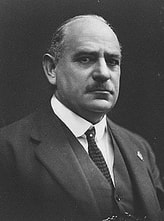 Sir John Monash
Sir John Monash There has been a 20-year campaign to remove the name of McMillan, a Gippsland pioneer who is now acknowledged to have been a key figure in massacres and other atrocities towards the local Aboriginal people.
Last month, the Victorian Redistribution Committee of the Australian Electoral Commission proposed the seat of McMillan should be renamed Monash, after Sir John Monash, the legendary army commander and civil engineer.
In a joint letter to the committee, the three local groups welcome the erasure of McMillan’s name from the electorate but formally object to the proposal to rename it Monash.
“It was notable that the volume of opposition to his name was considerable, with 27 initial submissions uniquely dedicated to McMillan, mostly protesting the name on the grounds of McMillan’s murderous behaviour towards Aboriginal people. We are happy that this stain has been removed from our federal seat.
“As representatives of the traditional owners of much of Gippsland we are, however, very disappointed that the Aboriginal choice of name has not been selected.”
The submission is signed by the CEO of the Bunurong Land Council, Dan Turnbull, the CEO of the Gunaikurnai Land and Waters Aboriginal Corporation, Roger Fenwick, and the secretary of the Bass Coast South Gippsland Reconciliation Group, Dr Marg Lynn.
They write: “This is not to diminish the worth of Sir John Monash who is an outstanding candidate for honours, and is associated with Gippsland through his founding of the State Electricity Commission nearly one hundred years ago. Monash is a revered figure to many Australians, and has thus been appropriately recognised already with the naming of a University, a scholarship, a hospital, a freeway, a municipality, and now the Sir John Monash Centre at Villers-Bretonneux, and, inappropriately, in a new political forum!
“Our concern at the overlooking of the Aboriginal name is two-fold. First, that the enduring trauma associated with McMillan that has been imposed on Aboriginal people deserves recognition and a just response. Secondly, that the collaborative and truly representative process undertaken by Gunnaikurnai and Bunurong People to find a name was an act of reconciliation offered to the Gippsland community, and has been declined.”
In an earlier submission to the AEC, the Gunnaikurnai-Bunurong Naming Committee had proposed the electorate be named Bunjileene-Purrine. Their proposal was ignored.
“The (AEC’s) naming criteria indicate a desire to consider an Aboriginal name and yet the AEC has not contacted us to discuss the proposal,” the new submission states.
“As the Redistribution Committee Report is silent on its reasons, we do not know if the Committee is satisfied that the removal of the name is sufficient change, or whether the choice of name is problematic.
“While the length of ‘Bunjileene-Purrine’ may pose a difficulty, we observe that the electorate of Carpentaria is equally long, with five syllables.
“If there is concern that the biographical detail is very brief, that is inevitable under the circumstances. McMillan and his colleagues did not record the life of those they captured or murdered. Purrine was known as a mighty warrior but lived before European entry to the land and therefore knowledge was orally and scantily preserved.
“If Monash was a pre-determined choice then we express our further disappointment with the process and the game we have been encouraged to play.”
The joint submission requests that the Gunnaikurnai-Bunurong Naming Committee be requested to reconvene and negotiate an Aboriginal name that will meet criteria as articulated by the AEC.